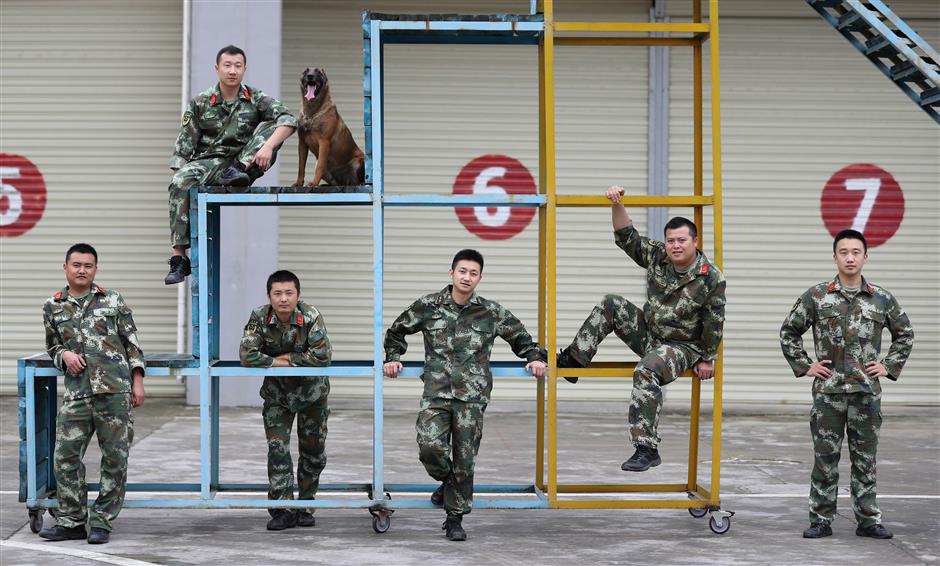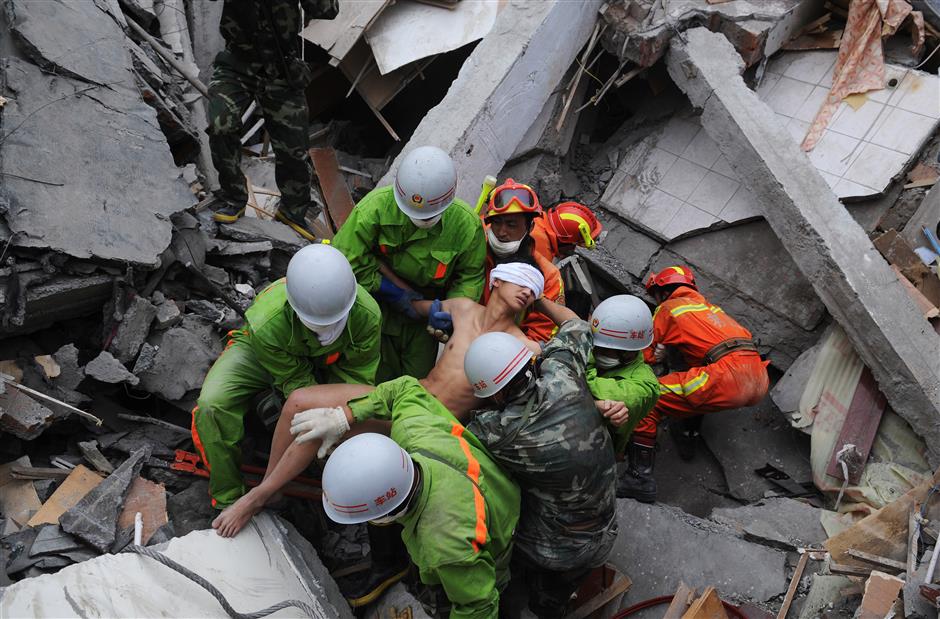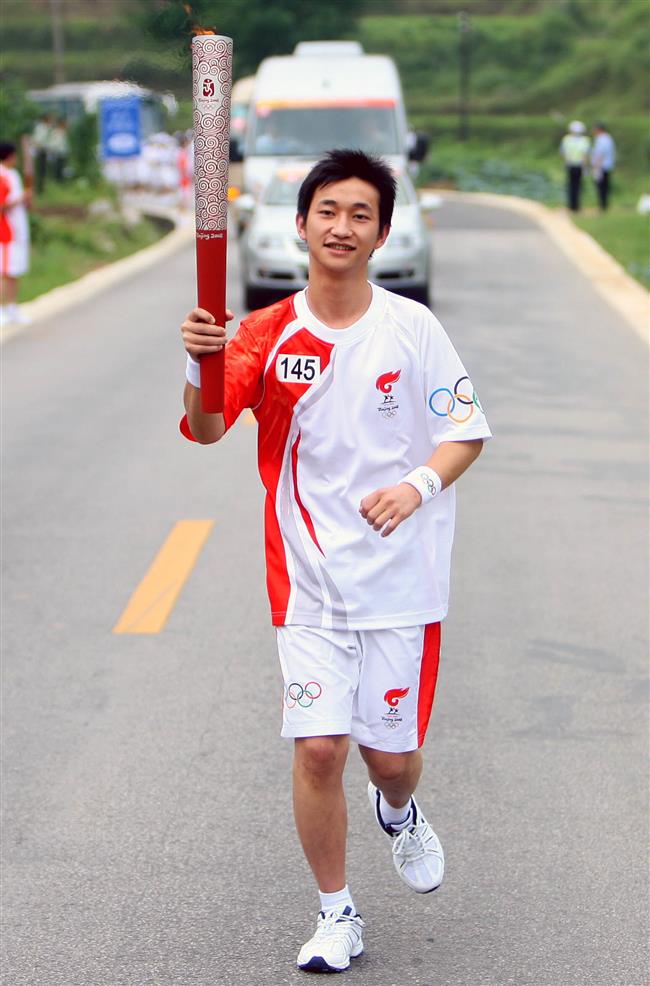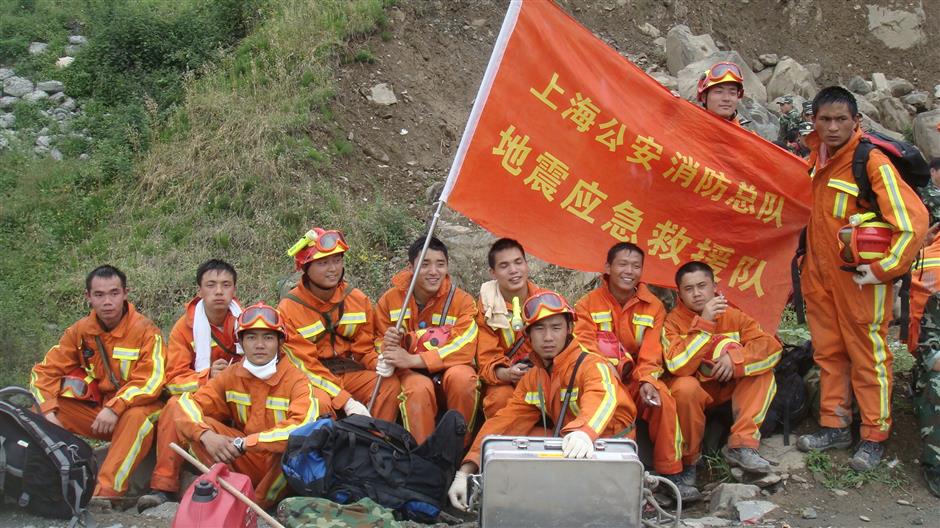Rescued become rescuer: a life dedicated to service

Jiang Yuhang (third from right) has returned to his hometown Kaili, in Guizhou Province, as vice chief of a regional fire squadron.
When Jiang Yuhang emerged from the rubble of China’s worst earthquake in six decades and saw daylight for the first time in five days, he was so impressed by Shanghai firefighting team who rescued him that he decided to devote his life to saving lives.
Jiang, now 29, was among the survivors at the epicenter of the Wenchuan earthquake on May 12, 2008. It left 69,000 people dead, 370,000 injured and 18,000 missing.
Jiang is now vice chief of a regional fire squadron in Guizhou Province after serving nine years in Shanghai. He talked by phone with Shanghai Daily about the disaster that will forever haunt his memories.
Ten years ago, Jiang, a Guizhou native, was an intern for the job of expressway toll collector in Yingxiu Town of Wenchuan County, Sichuan Province.
When the earthquake struck, he was in a hotel room that served as a dorm for him and two colleagues. The whole building collapsed before they could escape, he recalls.
Only later did he learn that he was trapped under the debris of six thick precast slabs.
“I could hear voices outside, but they couldn’t hear me,” he says. “I had no food or water. I think I survived because I had faith that the rescuers wouldn’t give up.”
He was pulled out after 125 hours, and his being rescued was called a “miracle.” His roommates didn’t survive.
“When I saw the rescuers, I felt happy and relieved,” he says.

In this May 2008 file photo, Jiang Yuhang was rescued from the collapsed building after 125 hours.
He was treated for physical exhaustion under the medical care of a team of doctors from the Shanghai No. 6 People’s Hospital.
“I decided that I wanted to be like the people who saved me,” he says.
Jiang joined the army and was later recruited as a firefighter in the Pengpu squadron of the Special Firefighting and Rescue Brigade of the Shanghai Public Security Bureau’s Fire Corps. He arrived in Shanghai at the end of 2008.
He says his family was a bit reluctant to see him go off to work in a city about 2,000 kilometers away but they understood his determination.
In the summer of his first year as a firefighter, he was at an apartment fire where a child was crying for help from an upstairs window. Jiang and his squad leader ran into the burning building and saved the kid.
“When I heard the gratitude of the child’s parents and praise from the neighbors about our bravery, I knew I had made the right career choice,” he says.
In the first three years, Jiang was a starting-level member of the squadron. Then he spent two years in full-time college training for fire service cadets in Kunming, capital of Yunnan Province. After that, he returned to Shanghai as a platoon leader, a second lieutenant.

Jiang Yuhang (left) leads a rescue team saving a man who's trapped under a truck in an accident in Shanghai's Jing'an District.

File photo taken on June 13, 2008, shows Jiang Yuhang running with the torch during the Beijing Olympics torch relay in his hometown Kaili.
Jiang says his years in Shanghai involved an array of activities, from the serious to the mundane — firefighting, hazardous chemical removal, preventing suicides, saving pets, opening locked doors and taking stuck rings off fingers.
“We work tactically and efficiently, with empathy but no superfluous emotion,” he says. “But I think it would seriously affect me if any of my colleagues lost a life in the line of duty.”
Jiang says he decided to return to his hometown, Kaili, because his parents were in failing health.
“I love my job and I want to apply all I’ve learned while working in Shanghai to help the people of my hometown,” he says.
When Jiang left Shanghai in March, he was the vice chief of the Pengpu fire squadron, a first lieutenant.
Firefighters were among the first responders
Xia Mingren has the scene implanted forever in his mind: the bare mountains, the flattened houses, the bodies of dead children on the ground.
He was one of 400 firefighters from Shanghai who joined the first rescue teams to reach Yingxiu Town in Sichuan Province after the massive earthquake of May 12, 2008.
Lt Col Xia, now chief of staff at the headquarters of the Jing’an District Public Security Bureau’s Fire Brigade, was among the first rescuers to be ferried by helicopter into the area of the epicenter of the quake two days after it struck.
“As soon as we landed, we were surrounded by a large number of locals,” he recalls. “And in their eyes I saw some rays of hope.”
On his first evening there, Xia and his colleagues pulled three children alive from the rubble of an elementary school.
“A lot of people would congregate whenever we announced that someone had been found alive,” he says.

Xia Mingren (third from left, back row) holds the flag of the earthquake rescue team of the Shanghai Public Security Bureau's Fire Corps. All of the people pictured worked for the Jinqiao squadron of the Special Firefighting and Rescue Brigade at that time. Xia was chief of the squadron. The photo was taken after their 10-day mission was completed.
In the first few days, roads remained blocked to relief convoys. The rescue teams slept in makeshift shelters of wood and plastic cloth. Intermittent rain didn’t help. Xia says he once saw a young rescuer sound asleep in a pool of water where he had fallen from sheer fatigue.
“Many of the younger ones who were with us in the rescue effort went on to become cadets, saying they were inspired to devote their careers to saving lives,” says Xia, who had been working as a firefighter for over 10 years by 2008.
One of the tools used by the Shanghai rescue team is now on display at a local memorial site.
Xia says several people he and his colleagues saved in the town later came to Shanghai to thank them in person, including Jiang Yuhang.
“No one wants such tragedies to happen again, but we know that we all stand ready in the face of any disaster,” Xia says.















